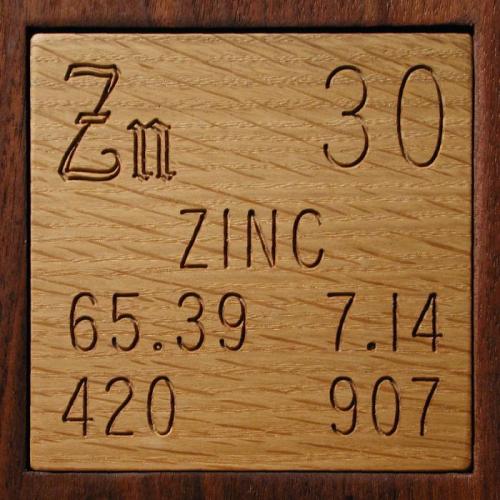Zinc-air hearing aid batteries.
Batteries generate electricity by allowing two chemicals to react with each other in a way that releases electrons, which are tapped and fed through a wire to do useful work. In most batteries both chemicals are present in the battery and they stay there: It's a sealed system. Fuel cells, like the hydrogen-oxygen fuel cells that are looking so promising, use the same idea except instead of being sealed, they accept a continuous flow of the two chemicals from storage tanks: This allows them to operate indefinitely.
These zinc-air batteries are exactly half way in between. The chemical reaction they use is the oxidation of zinc metal by the oxygen in air. The zinc is built in to the battery and can't be replaced, while the air flows in as needed to replenish air used up in generating electricity. So, it's a fuel cell with regards to oxygen and a conventional battery with regards to zinc.
These batteries provide a very large amount of energy per unit weight, because they only have to carry half the chemicals, the rest coming from the air. It's the same reason jet engines can go further than rockets on the same weight of fuel: The jet is taking half its "fuel" from the surrounding air. And just like with jets and rockets, the reason not all batteries are zinc air batteries is that you can't get as much instantaneous power out of them, because you have to wait for enough air to get into the system.
In a conventional battery you can draw a very large amount of current if you want, because both chemicals you need are right there ready to react. Same in a rocket. In a zinc-air battery you can only draw as much current as their is air flow to sustain it. Same in a jet engine. As a result, zinc-air batteries are used in applications that require slow, steady amounts of power, like a hearing aid or monitoring device. Similarly, jet engines are used in places where you need a steady amount of power for a long time, like a transatlantic flight. Rockets are used when you want a huge amount of power in a very short time, or, of course, in places where there is no air. That's right, zinc-air batteries would not work in space.
Source: eBay seller free-shipping-auctions
Contributor: Theodore Gray
Acquired: 15 January, 2004
Text Updated: 11 March, 2007
Price: $10/32
Size: 0.5"
Purity: 10%
Sample Group: Medical
|
| 
|
|